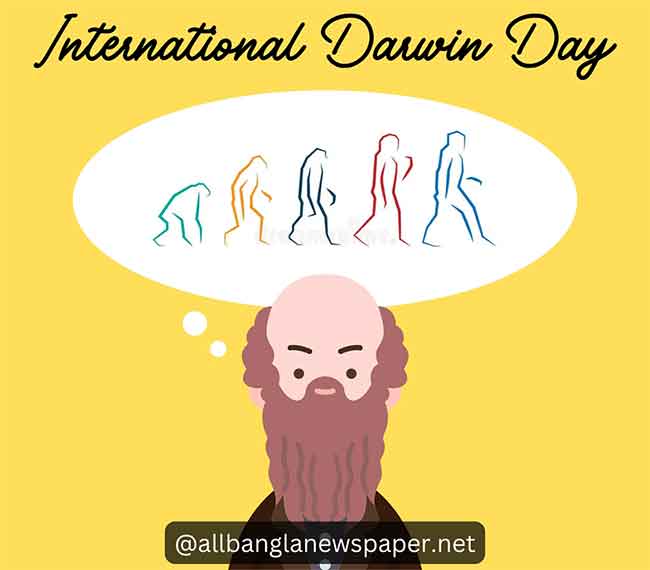
International Darwin Day serves as a global celebration of science and humanity, as well as the groundbreaking contributions of Charles Darwin. This annual event honours the life and work of one of history's most influential figures, whose theory of evolution by natural selection revolutionized our understanding of the natural world. Observed on February 12, the day not only commemorates Darwin's birthday but also highlights the enduring impact of his discoveries on modern science and society. From academic discussions to community events, International Darwin Day fosters curiosity and encourages people to reflect on the importance of scientific inquiry.

The observance of this day transcends borders, uniting individuals who share a passion for knowledge and discovery. It provides an opportunity to delve into evolution, biodiversity, and the interconnectedness of life on Earth. Understanding the significance of International Darwin Day UPSC materials can be particularly beneficial for students preparing for competitive exams like the UPSC. These resources often emphasize how Darwin's theories laid the foundation for fields like biology, anthropology, and environmental science, making it essential for aspirants to grasp their relevance in contemporary contexts.
Beyond its scientific implications, International Darwin Day also promotes values like critical thinking, open-mindedness, and respect for evidence-based reasoning. In a world where misinformation can spread rapidly, celebrating this day reinforces the importance of relying on facts and rigorous research. Whether through formal education or informal learning, Charles Darwin's legacy inspires generations to explore, question, and innovate.
The Life and Achievements of Charles Darwin
Charles Darwin's journey as a scientist began with a relentless curiosity about the natural world, eventually leading him to propose the theory of evolution by natural selection. Born on February 12, 1809, in Shrewsbury, England, Darwin was fascinated with nature, collecting specimens and observing wildlife during his formative years. His pivotal voyage aboard the HMS Beagle from 1831 to 1836 marked a turning point in his career, exposing him to diverse ecosystems and geological formations that would later inform his groundbreaking ideas. During this expedition, Darwin meticulously documented the variations in species across different environments, laying the groundwork for his revolutionary theory.
Upon returning to England, Darwin spent decades analyzing his findings and refining his thoughts before publishing "On the Origin of Species" in 1859. This seminal work introduced the concept of natural selection, explaining how organisms evolve through the survival and reproduction of the fittest individuals. Darwin's theory challenged prevailing beliefs about the origins of life and sparked widespread debate among scientists, theologians, and the general public. Despite criticism and scepticism, his ideas gained acceptance as subsequent research provided mounting evidence supporting his claims.
Darwin's contributions extended beyond biology, influencing anthropology, psychology, and ecology. His insights into adaptation and diversity continue to shape our understanding of life on Earth, underscoring the interconnectedness of all living beings. The celebration of International Darwin Day serves as a reminder of his enduring legacy and the profound impact of his work on modern science.
Evolution Day A Celebration of Scientific Discovery
Evolution Day is a significant counterpart to International Darwin Day, focusing specifically on the principles of evolution and their broader implications for humanity. While International Darwin Day emphasizes Charles Darwin's achievements, Evolution Day broadens the scope to celebrate the collective progress in understanding life's complexities. This day invites individuals to reflect on how evolutionary theory has transformed various fields, from medicine to conservation, and how it continues to guide scientific exploration today. By highlighting these advancements, Evolution Day fosters a deeper appreciation for the mechanisms driving biodiversity and adaptation.
One of the key objectives of Evolution Day is to promote public awareness about the role of evolution in addressing contemporary challenges. For instance, understanding genetic variation and natural selection has paved the way for breakthroughs in medical research, enabling scientists to develop targeted treatments for diseases. Similarly, evolutionary principles inform conservation efforts, helping experts protect endangered species and restore fragile ecosystems. These applications demonstrate the practical relevance of Darwin's theories and underscore their importance in shaping a sustainable future.
Educational institutions and scientific organizations often host events during Evolution Day to engage communities in discussions about these topics. Lectures, workshops, and interactive exhibits provide opportunities for people of all ages to learn about the wonders of evolution and its ongoing influence. By fostering curiosity and critical thinking, Evolution Day complements the goals of International Darwin Day, reinforcing the value of scientific literacy in an ever-changing world.
Darwin Discovery Day Honoring Scientific Exploration
Darwin Discovery Day offers a unique platform to honour the spirit of scientific exploration that defined Charles Darwin's career. This occasion celebrates discovery, encouraging individuals to embrace curiosity and innovation. By commemorating the milestones of Darwin's journey, from his observations during the HMS Beagle voyage to his meticulous documentation of species, Darwin Discovery Day inspires people to adopt a similar mindset of inquiry and perseverance. It serves as a reminder that groundbreaking discoveries often stem from persistent questioning and a willingness to challenge established norms.
This day also highlights the collaborative nature of scientific progress, emphasizing how Darwin's work built upon the contributions of earlier thinkers while paving the way for future researchers. For example, his correspondence with fellow scientists like Alfred Russel Wallace demonstrates the importance of sharing knowledge and engaging in dialogue to advance understanding. Modern initiatives inspired by Darwin Discovery Day often include citizen science projects, where individuals contribute to research by collecting data or participating in experiments. These activities democratize science and empower people to expand human knowledge actively.
By fostering a culture of exploration, Darwin Discovery Day aligns seamlessly with the goals of International Darwin Day. Together, these celebrations underscore the transformative power of curiosity and the enduring relevance of Darwin's legacy in inspiring new generations of thinkers and innovators.
Darwin Awards A Humorous Take on Human Behavior
While International Darwin Day celebrates Charles Darwin's profound contributions to science, the Darwin Awards offer a lighthearted and satirical perspective on human behaviour. Established in the spirit of humour, these awards recognize individuals who inadvertently remove themselves from the gene pool through acts of remarkable imprudence. Though not officially affiliated with Darwin's legacy, the awards draw inspiration from his theory of natural selection, humorously suggesting that such actions might reflect an extreme form of "survival of the fittest." This playful take on evolution has garnered widespread attention, becoming a cultural phenomenon that sparks laughter and reflection.
The Darwin Awards serve as a reminder of the importance of critical thinking and responsible decision-making. Each year, nominees are selected based on real-life incidents highlighting the consequences of poor judgment or reckless behaviour. While the stories are often exaggerated for comedic effect, they carry an underlying message about the value of foresight and caution. For many, the awards act as a humorous yet thought-provoking commentary on human nature, encouraging audiences to consider the broader implications of their actions.
Though distinct from the more formal observances of International Darwin Day, the Darwin Awards complement the celebration by engaging a wider audience in discussions about evolution and human behaviour. Their blend of humour and insight ensures that even those unfamiliar with Darwin's scientific work can appreciate the enduring relevance of his ideas in everyday life.
Darwin Week A Week-Long Celebration of Science
Darwin Week transforms the commemoration of International Darwin Day into a vibrant, week-long celebration dedicated to science, education, and community engagement. Hosted by universities, museums, and scientific organizations around the globe, this event features diverse activities designed to inspire curiosity and foster a deeper understanding of evolutionary biology. Lectures by renowned scientists, hands-on workshops, and interactive exhibits allow participants to explore complex concepts in an accessible and engaging manner. These activities honour Charles Darwin's contributions and emphasize the ongoing relevance of his theories in addressing modern challenges.
One of the highlights of Darwin Week is its focus on inclusivity, welcoming individuals of all ages and backgrounds to participate in the festivities. Schools often integrate special lessons and projects into their curricula, introducing students to the principles of evolution and encouraging them to think critically about the natural world. Community events, such as film screenings and panel discussions, further extend the reach of Darwin Week, creating spaces for dialogue and collaboration. These initiatives help bridge the gap between academic research and public understanding, ensuring that science remains accessible.
By extending the celebration beyond a single day, Darwin Week amplifies the impact of International Darwin Day, reinforcing the importance of scientific literacy and lifelong learning. Its diverse programming ensures that participants leave with a renewed appreciation for the wonders of evolution and Charles Darwin's enduring legacy.
Charles Darwin's Death Date A Reflection on Legacy
The death of Charles Darwin on April 19, 1882, marked the end of a remarkable life but not the conclusion of his influence on science and society. His passing was mourned by scholars and admirers worldwide, yet his legacy continues to thrive, shaping countless fields of study and inspiring new generations of thinkers. Darwin's contributions to evolutionary biology remain foundational, providing a framework for understanding the complexity and diversity of life on Earth. His work has been instrumental in advancing disciplines such as genetics, ecology, and palaeontology, ensuring that his ideas remain relevant long after his death.
Reflecting on Charles Darwin's death date offers an opportunity to appreciate the enduring impact of his theories. Decades after his passing, researchers continue to build upon his discoveries, uncovering new insights into the mechanisms of evolution and adaptation. For instance, advances in molecular biology have deepened our understanding of genetic variation, validating Darwin's original hypotheses while expanding their scope. This ongoing progress underscores the timeless nature of his contributions and highlights the importance of scientific inquiry in addressing unanswered questions.
Commemorating Darwin's life and work on days like International Darwin Day ensures his legacy remains in the public consciousness. By honouring his achievements and reflecting on his enduring influence, we celebrate the man himself and the spirit of curiosity and discovery he embodied.
Darwin Days MN Local Celebrations of Global Significance
In Minnesota, Darwin Days MN is a testament to how local communities can bring global celebrations like International Darwin Day to life. This regional initiative organizes events catering to diverse audiences, from students and educators to families and science enthusiasts. Activities range from interactive workshops and museum exhibits to outdoor explorations and panel discussions, all designed to make the principles of evolution accessible and engaging. By tailoring these events to the interests and needs of the local population, Darwin Days MN ensures that participants leave with a deeper appreciation for Charles Darwin's contributions and the broader implications of his work.
One of the standout features of Darwin Days MN is its emphasis on community involvement. Volunteers, educators, and local organizations collaborate to create programming that reflects the unique character of Minnesota while staying true to the spirit of International Darwin Day. For example, guided nature walks allow participants to observe local flora and fauna through the lens of evolutionary biology, connecting abstract concepts to tangible experiences. Similarly, art installations and storytelling sessions provide creative avenues for exploring themes of adaptation and biodiversity, appealing to audiences who may not typically engage with scientific topics.
Through its innovative approach, Darwin Days MN exemplifies how localized celebrations can amplify the global significance of International Darwin Day. By fostering a sense of ownership and pride within the community, these events ensure that Darwin's legacy continues to resonate on both personal and collective levels.
International Customs Day Bridging Cultures Through Tradition
While International Darwin Day celebrates scientific achievements, International Customs Day highlights the importance of cultural traditions and their role in fostering global unity. Observed on January 26, this day recognizes the customs and practices that define communities around the world, emphasizing their value in preserving heritage and promoting mutual understanding. Just as Darwin's theories connect humanity through shared biological origins, cultural customs serve as bridges that unite people across geographical and linguistic boundaries. Both celebrations underscore the interconnectedness of human experiences, albeit through different lenses.
The parallels between these observances extend to their educational potential. International Customs Day encourages individuals to learn about diverse traditions, fostering empathy and respect for cultural differences. Similarly, International Darwin Day inspires curiosity about the natural world, challenging people to think critically about their place within it. These events remind us that understanding and cooperation—rooted in science or culture—are essential for building a harmonious global society.
By recognizing the complementary nature of these celebrations, we can appreciate how science and tradition enrich our lives in unique yet interconnected ways. International Darwin Day and International Customs Day invite us to embrace knowledge, curiosity, and collaboration as tools for creating a better future.
Continuing the Legacy of Charles Darwin
The celebration of International Darwin Day extends far beyond honouring the life and work of Charles Darwin; it serves as a call to action for individuals and communities to embrace the principles of curiosity, exploration, and evidence-based reasoning. Darwin's groundbreaking theories inspire advancements in science, education, and societal understanding, proving that his legacy is as relevant today as it was during his lifetime. By participating in events like Darwin Week, Darwin Discovery Day, and localized initiatives such as Darwin Days MN, people worldwide can actively contribute to the ongoing dialogue about evolution and its implications for humanity.
Resources related to International Darwin Day UPSC materials offer valuable insights into modern biology's scientific and philosophical foundations for students preparing for competitive exams like the UPSC. These resources deepen our understanding of Darwin's contributions and highlight the interdisciplinary nature of his work, which spans fields like anthropology, ecology, and genetics. Similarly, celebrations like Evolution Day and the humorous yet thought-provoking Darwin Awards demonstrate the versatility of Darwin's ideas, showing how they resonate across different contexts and audiences.
As we reflect on Charles Darwin's death date and the enduring impact of his discoveries, it becomes clear that his legacy is not confined to history books. Instead, it lives on through the countless ways his theories continue to shape our understanding of the world. By fostering a culture of inquiry and collaboration, International Darwin Day ensures that Darwin's spirit of exploration remains alive, inspiring future generations to push the boundaries of knowledge and innovation.
#InternationalDarwinDay #InternationalDarwinDayUPSC #WhenIsDarwinWattersonsBirthday



